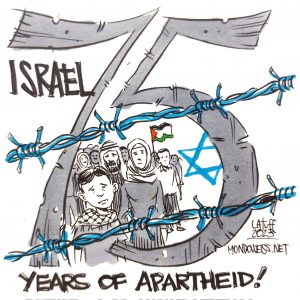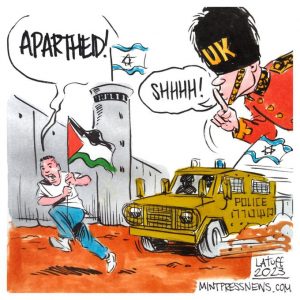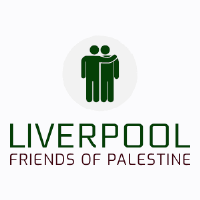
There is a growing international consensus that Israel is an apartheid state. The Israeli human rights organisation Btselem produced on 12 January 2021 a report setting out clearly how Israel is properly described as an apartheid state ‘from the river to the sea’. Read their report HERE. Evidence pointing in the same direction has been gathered by the international organisation Human Rights Watch whose report, entitled A Threshold Crossed, can be found HERE.
Amnesty International produced a blockbuster report in February 2022 reaching the same conclusion. Their lengthy full report is HERE, there is a 15-minute youtube summary HERE and a 90-minute online course is available free from Amnesty HERE.
For a list of Israeli laws that entrench apartheid, see THIS LIST produced by the Adalah legal centre and for other measures (to June 2021) see HERE
THE MANY CATEGORIES OF ISRAELI APARTHEID
This list of ‘8 tiers of Israeli apartheid’ is supplied by the historian Zachary Foster (dates etc are as at July 2024)
The State of Israel recognizes 8 tiers of people under its control. For all 8 tiers, Israel controls the registration of births, marriages, divorces, deaths and address changes. Israel controls the telecommunication networks, electricity grids, water supply, airspace and currency. Israel controls the movement of people in and out of the country. All tiers of people are controlled by a single state, with a single Prime Minister, a single Defense Minister, a single cabinet and a single chain of military command. But each tier has different legal rights. That’s why every major human rights organization has called Israel an apartheid state. This is a brief survey of how it operates.
Tier 1: Jewish citizens of Israel (7.2 million people) – Jewish citizens of Israel have full voting rights. They can rent, buy or own property in 900+ localities in Israel. They can buy property from the Jewish National Fund, which owns about 13% of the land of Israel. There are no family reunification restrictions on Jews. Jews can destroy Palestinian property in the West Bank with near total impunity. Jews who protest their government rarely encounter lethal or even disproportionate violence by the Israeli police. The Israeli Parliament is likely to forbid the state from placing Jews in “administrative detention,” in which a person is imprisoned without trial and without having committed an offense. In 2018, Israeli lawmakers passed the nation-state law, defining Israel as a state for the Jewish people. The state exists for the purpose of serving the interests of Jews. This is not the case for any other tier.
Tier 2: Palestinian (& other non-Jewish) citizens of Israel (2.5 million people) – Palestinian citizens of Israel have full voting rights. But they are in practice barred from buying or owning land in 900+ localities in Israel. They cannot buy property from the Jewish National Fund, which owns about 13% of the land of Israel. Palestinian citizens are prohibited from having their family members in the West Bank or Gaza live with them in Israel. Palestinians who protest the Israeli government often face disproportionate violence or retribution, such as a 1997 protest where Israeli forces injured hundreds of Palestinians protesting the confiscation of 10,000 acres of land near Umm al-Fahm. Palestinian schools, local councils and municipalities receive far less funds per capita than Jewish ones. The Israeli Parliament is likely to pass a law allowing the state to limit the effective use of its “administrative detention” policy to Palestinians only.
Tier 3: Unrecognized Palestinian Citizens of Israel, (85,000 people) – These citizens of Israel live in dozens of communities unrecognized by the State of Israel. They are primarily of Bedouin origin and have been living in Israel long before Israel existed, indeed, before Zionism existed. Their communities are denied access to the Israeli electrical grid, water mains and trash-pickup. Israel does not allow public buses to reach them. Israel does not pave the roads nor does it allow new construction in the unrecognized towns. There are outstanding home demolition orders on thousands of homes and structures in the unrecognized towns that can be executed on at any moment. In May 2024, for example, Israeli forces demolished 47 homes in Wadi al-Khalil, an unrecognized Palestinian Bedouin village in southern Israel resulting in the forcible displacement of over 300 Palestinian Bedouins
Tier 4: Palestinians living in Israeli occupied East Jerusalem (360,000 people) – Palestinian residents of East Jerusalem are not given Israeli citizenship at birth, even though they live in territory annexed by Israel in 1967. Instead, they are provided residency permits that can be revoked. Since 1967, Israel has stripped more than 15,000 East Jerusalem Palestinians of their residency permits. Israel also rejects 93% of Palestinian building permit applications in E. Jerusalem, which has meant that 85% of Palestinian homes in E. Jerusalem are considered illegal and could be demolished at any moment. Israeli law also allows Jews to take over property in E. Jerusalem once owned by Jews before 1948, but does not allow Palestinians to take over property they once owned before 1948 in West Jerusalem or anywhere else. In Jerusalem, Palestinian schools, clinics, hospitals, parks and roads are all underfunded relative to Jewish ones.
Tier 5: Palestinians living in Area A of the West Bank (1.6 million) – Palestinians living in Area A of the West Bank are stateless peoples who have been subject to a 57-year long Israeli military occupation. They do not have the right to vote for the government that controls their lives. They do not have freedom of movement within the West Bank nor can they leave the West Bank without a permit. And, If they leave for more than 3 years, they can lose their right to be an occupied, stateless person. They can be imprisoned indefinitely without charge, a policy known as “administrative detention.” The water under the ground and the sky over their heads is controlled by Israel. In addition, the Israeli military’s subcontractor, the Palestinian Authority (PA), further restricts their freedom of assembly and freedom of speech through violent crackdown on protests and imprisonment or murder of political opponents, such as Nizar Banat.
Tier 6: Palestinians living in Area B of the West Bank (1.3 million) – Palestinians living in Area B of the West Bank are stateless peoples who have been subject to a 57-year long Israeli military occupation. They face the same restrictions on their freedom of movement and speech and right to residence and assembly as Area A West Bank Palestinians. In addition, they encounter Israeli checkpoints whenever passing into Area A or C of the West Bank. They must obtain permits to access their lands if they happen to be in Area A or C. Moreover, the current Israeli government has begun expanding its control over Area B just as it has over Area C (discussed subsequently), making it the next major site for Israel’s ongoing land seizures and depopulation efforts. This has involved the legalization of five settlement outposts in the West Bank, and the issuance of tenders for thousands of new housing units in Israeli settlements in Area B.
Tier 7: Palestinians living in Area C of the West Bank (100,000 people) – Palestinians living in Area C of the West Bank are stateless peoples who have been subject to a 57-year long Israeli military occupation. They face even more restrictions on their freedom of movement and speech, as well as right to residency and assembly as Area A and B West Bank Palestinians. Less than 1% of the land in Area C is currently available to Palestinians for construction. Palestinians living in Area C are 100 times more likely to have demolition orders placed on their homes than be granted permits to build homes. Meanwhile, a dozen some Palestinian communities in Area C have been ethnically cleansed in the past few years in Khirbet Humsa, Masafer Yatta, Ein Samiya, Ras a-Tin, Lifjim, Khirbet Zanuta, Khirbet al-Ratheem, al-Qanub, Ein al-Rashash and Wadi al-Seeq.
Tier 8: Palestinians Living in Gaza (2.2 million people) – Palestinians living in Gaza are stateless peoples who have been living under Israeli military occupation for 57 years, as well as a 17-year long siege and a 9-month genocidal onslaught. In just the past 9+ months, Israel has denied the people of Gaza the right to shelter, health care, water, food, electricity and the right to life itself: Israel has killed at least 39,000 Palestinians in Gaza with as many as 186,000 likely to die from the genocide. Israel is also starving to death more than 1 million Palestinians in Gaza and leaving the rest in conditions of hunger and catastrophic food insecurity. Israel has reduced the amount of water available in Gaza by 94%. Israel has damaged or completely destroyed every single hospital in Gaza and completely destroyed 76% of Gaza’s schools. Israel has also forcibly displaced nearly all 2.2 million Palestinians in Gaza.
THE AMNESTY REPORT
Amnesty International on 1 February 2022 released a report Israel’s apartheid against Palestinians – cruel system of domination and crime against humanity. The lengthy full report is HERE, there is a 15-minute youtube summary HERE and a 90-minute online course is available free from Amnesty HERE. “Whether they live in Gaza, East Jerusalem and the rest of the West Bank, or Israel itself, Palestinians are treated as an inferior racial group and systematically deprived of their rights,” Amnesty’s secretary general, Agnès Callamard, said while introducing the report, “Israel’s cruel policies of segregation, dispossession and exclusion across all territories under its control clearly amount to apartheid.”
Our own leaflet, Palestinians ruled by Israeli apartheid, is HERE, with Arabic version HERE.
REACTIONS TO THE AMNESTY REPORT
The Amnesty report was welcomed by a host of Israeli human rights groups whose statement is HERE. A review in the Electronic Intifada online explains how the report breaks some new ground and is HERE. A further report was published at the end of February from the human rights organisation Addameer (in conjunction with the International Human Rights Clinic at Harvard Law School) and can be read HERE. A 22-minute documentary from Mondoweiss can be found HERE.
The European Commission took its time before commenting on the Amnesty report. On 20 January 2023, eleven months after its publication, the Commission dismissed the report with these words: “The Commission is aware of the report referred to by the Honourable Members and is giving it due attention. In any case, the Commission considers that it is not appropriate to use the term apartheid in connection with the State of Israel. The Commission uses the non-legally binding working definition of antisemitism of the International Holocaust Remembrance Alliance (IHRA definition) as a practical guidance tool and a basis for its work to combat antisemitism. Claiming that the existence of a State of Israel is a racist endeavour is amongst the illustrative examples included under the IHRA definition. The EU and its Member States will continue to closely monitor the developments on the ground. The respect of international humanitarian law and international human rights law by state and non-state actors, and accountability for violations committed, are a cornerstone for peace and security in the Middle East region. The EU remains committed to a negotiated two-State solution, based on international law, the 1967 lines, with equivalent land swaps, as may be agreed between the parties, with the State of Israel and an independent, democratic, contiguous, sovereign and viable State of Palestine[1], living side by side in peace, security and mutual recognition.”
A large consortium of Palestinian organisations countered the European Commission with a lengthy statement that can be found HERE: “Many of the most pre-eminent scholars of Jewish life, history and persecution have warned that the struggle against antisemitism in the world is being weakened by the unbearable, inaccurate and instrumentalised use to which the antisemitism accusation is lodged for political ends.”
THE REACTION IN BRITAIN
As for the reaction to the Amnesty report in Britain, for weeks there was complete silence from all the main British political parties. The Labour Party commented that ‘this is a detailed report that we will consider carefully’ but there was no reaction until eventually in April 2022 Labour leader Keir Starmer gave an interview saying he did not agree with the Amnesty report. He did not say why. He was roundly criticised in THIS ARTICLE. There was no Parliamentary Early Day Motion on the subject. On 18 July 2022 an online briefing was hosted by Arise and ‘Labour & Palestine’: watch it HERE (and note the contributions from Liverpool’s Kim Johnson MP at 8min 30sec and the Palestinian Ambassador at 29min 45sec).
OTHER REPORTS
Specifically on Gaza, Al-Haq in January 2022 produced a report Cultural Apartheid – Israel’s cultural erasure in Gaza, which you can find and download HERE. The report includes material from Forensic Architecture.
On 25 March 2022 the United Nations Human Rights Council heard from Michael Lynk, its outgoing ‘special rapporteur’ who concluded that the political system of entrenched rule in the occupied Palestinian territory ‘satisfied the prevailing evidentiary standard for the existence of apartheid’. First, an institutionalised regime of systematic racial oppression and discrimination has been established. Second, this system of alien rule had been established with the intent to maintain the domination of one racial-national-ethnic group over another. And third, the imposition of this system of institutionalised discrimination with the intent of permanent domination had been built upon the regular practice of inhuman(e) acts. This was apartheid. With the eyes of the international community wide open, Israel had imposed upon Palestine an apartheid reality in a post-apartheid world. The tabled report for the meeting is HERE (it is report A/HRC/49/25).
Israel and supporters have railed against Amnesty International and threatened to downgrade Amnesty’s status in Israel. But as if to make the case, the Israeli parliament has in March 2022 passed a law reinstating the ban on Palestinians married to Israeli citizens from getting residence in Israel (read about it HERE and HERE).
Al-Haq produced a further report in November 2022 that was endorsed by several other organisations; you can find it HERE. Al-Haq have also in 2023 produced a 9-minute film setting out the history, watch it HERE.
The Anglican Church’s South African committee passed THIS RESOLUTION on 27 September 2023,,noting that Israel is regarded as an apartheid state and giving some guidance on how pilgrimages to the Holy Land should be conducted.

